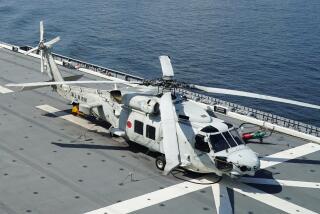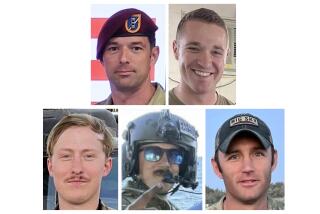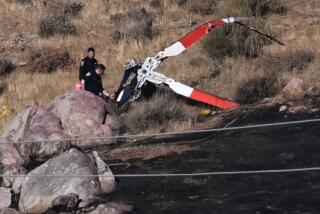17 Spanish Troops Killed in Afghanistan Crash
- Share via
KABUL, Afghanistan — Seventeen Spanish soldiers training to provide security for next month’s election were killed Tuesday when their helicopter crashed in western Afghanistan.
A statement by the NATO-led International Security Assistance Force called the crash an accident, but Spanish authorities would not rule out the possibility of hostile fire.
Two helicopters were flying near Adraskan, south of Herat, when their rotors accidentally touched, said Gen. Mohammed Zahir Azimi, a spokesman for the Afghan defense ministry in Kabul, the capital. Spanish troops have a base in Herat.
Afghan soldiers and North Atlantic Treaty Organization forces moved in to secure the crash site, about 400 miles west of Kabul, Azimi said.
Other reports from the region said there was a dust storm in the area at the time.
“The cause of the accident is currently unknown and it will be the subject of a full investigation,” the ISAF statement said.
The troops, who were part of a NATO stabilization force, were flying in a Cougar AS532 helicopter when the incident occurred about 11:30 a.m. Tuesday.
Five Spanish soldiers were injured when a second Cougar helicopter made a forced landing, the statement added.
The crash site is on the other side of the country from where U.S.-led forces are fighting Taliban and allied insurgents, so hostile fire was quickly ruled out as a likely cause of the accident.
But in Madrid, Spanish Defense Minister Jose Bono said Tuesday that no possibility had been eliminated, including that the chopper might have been shot down.
“Initially, it was thought exclusively that this was an accident, but in photographs we see that although the area is very mountainous, the crash was in a field,” Bono said at a news conference. “That is why we cannot absolutely discard that this might have been an external attack.”
Spanish officials’ description of the crash differed from the Afghan spokesman’s. They said the second helicopter was flying with the first, then saw a plume of smoke coming from the crash site. It apparently made the emergency landing because of fears of hostile fire.
Bono was to travel to Afghanistan to oversee the identification of bodies and their repatriation.
Prime Minister Jose Luis Rodriguez Zapatero interrupted his vacation on the Canary Islands and returned to Madrid to meet with Bono and other officials. He made a televised appearance Tuesday evening to pay homage to the dead men, praise the “crucial role” they played in international peacekeeping and promise a full investigation.
“They have honored their promise to defend liberty and peace, supreme values that Spain is committed to,” he said.
In contrast to Spain’s now-ended participation in the U.S. military mission in Iraq, the deployment of troops in Afghanistan has not been controversial among Spaniards. Politicians of all stripes were quick to issue condolences to families and the armed forces and to express support for the government’s efforts to investigate the crash.
Spain has 850 troops in Afghanistan, part of the NATO deployment. It recently reinforced the contingent to help improve security in anticipation of the Sept. 18 election, when Afghans will elect a lower house of parliament and provincial councils.
It’s the second time that Spain has lost troops assigned to Afghanistan in an air crash. In May 2003, 62 Spanish soldiers died when their transport plane crashed in Turkey, en route to Afghanistan.
In June, 16 U.S. Special Forces died when their twin-rotor transport helicopter was shot down in Kunar province near the border with Pakistan, apparently by a rocket-propelled grenade fired by suspected Taliban insurgents. The soldiers were on a mission to rescue a four-member Navy SEAL reconnaissance team ambushed by guerrillas. One of the SEALs survived after he took shelter in a shepherd’s home.
Watson reported from Kabul and Wilkinson from Rome. Special correspondent Wasal Zaman in Kabul contributed to this report.
More to Read
Sign up for Essential California
The most important California stories and recommendations in your inbox every morning.
You may occasionally receive promotional content from the Los Angeles Times.














